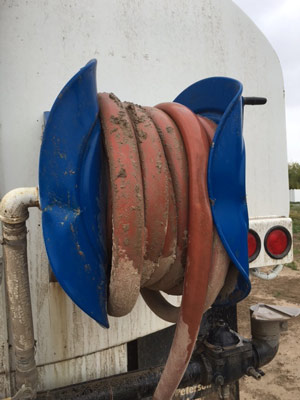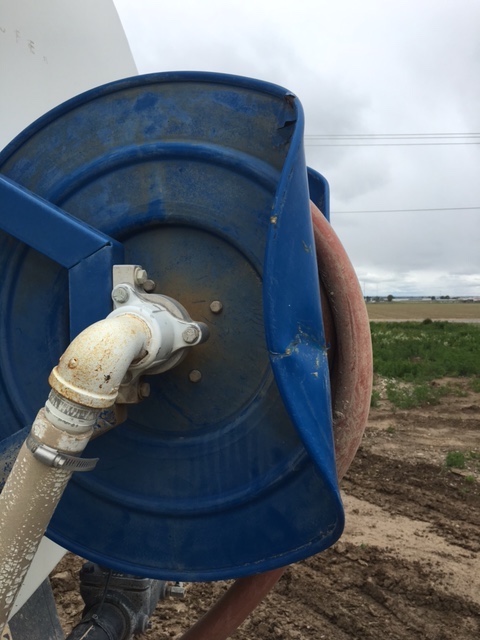Pest Control Equipment: If It is Critical, Back it Up!
Posted by Andrew Greess on Sep 24, 2017
Have you ever lost an important computer file that you really needed right now? I bet that each of us has experienced this situation. Hopefully, we learn from our mistake and start backing up our critical files.
Pest (and landscape) Professionals have the same issue with their pest control equipment. We rely heavily on our equipment, yet in many cases, we have no backup. If you have a piece of equipment that is critical to your pest management business then it is vital that you have a backup.

Photo right): Technician Backed Termite Control Sprayer into Wall. Destroying Hose Reel. No Backup available.
It doesn’t matter what the equipment is, truck, trailer, power sprayer, Birchmeier Backpack or B&G sprayer, etc. If you can’t do your job without the item, keep a backup. We see pest control companies of all sizes, from owner/operator to huge national fleets that seem surprised when a key piece of pest equipment fails.
We know of a large regional pest control firm that has over 120 pest control service vehicles in the local market, yet has no backup!
When one of their vehicles, or one of their sprayers in one of their vehicles, needs service, the technician can’t run his route. When you have 120 vehicles in your fleet, the odds that one of them will have a problem on any given day are pretty good. This is crazy. If you can afford 120 vehicles, you can afford 121 vehicles!
What happens when we don’t have the PMP equipment we need to complete our jobs?
- Missed & canceled appointments
- Unhappy customers
- Lost revenue
- Employee downtime waiting for equipment
- Employee downtime running around town trying to find a solution
- Overtime expenses
- Higher repair expenses.
What are some of the operating conditions that require backup equipment?
- Equipment failure
- Equipment down for maintenance
- Equipment in the wrong location
- Equipment contains the wrong product (chemical)
- Equipment on a vehicle that was in a traffic accident
- Equipment misused by a technician who causes damage.
It gets worse.
Equipment fails during your busy season, when you can least afford downtime. This is also the time when your customer’s pest pressure is greatest so they may be less willing to tolerate delays. Demand for repair services is greatest – there may be a delay in getting a replacement. Many vendors cut back on inventory during the recession, which could mean getting replacement parts takes longer.
 Damaged Termite Spray Rig - side view
Damaged Termite Spray Rig - side view
What do we do about this problem?
1. Identify critical equipment.
Review your equipment by vehicle, by service, by technician to identify the most important tools.
2. Develop a backup plan for each critical item
For some items it may be easiest to buy a replacement. For more expensive items, you may have to get creative. Look through that pile of used equipment in the corner and see if you can create something valuable out of it. Keeping a trailer in reserve can be cheaper than keeping an extra vehicle in the fleet. Or select the oldest piece of equipment, replace it with new and keep the old one as the backup.
3. Review your plan.
Review your backup plan annually to ensure it is still applicable. Test the backup equipment periodically to ensure it is functioning properly. Don’t assume that equipment sitting in the corner for years is still going to work.
A little time spent identifying critical equipment and developing backup plans will save time, money and stress during your busy pest control season.
For more great tips on reducing downtime, repair expense and missed appointments, please visit: https://www.qspray.com/top-10-spray-equipment-productivity-tips/
Andrew Greess is the President of Qspray.com, the leading website for professional grade Pest & Landscape Spray Equipment. For more great suggestions on improving your equipment productivity visit SprayEquipmentBlog.com or follow Greess on FB & Twitter.

